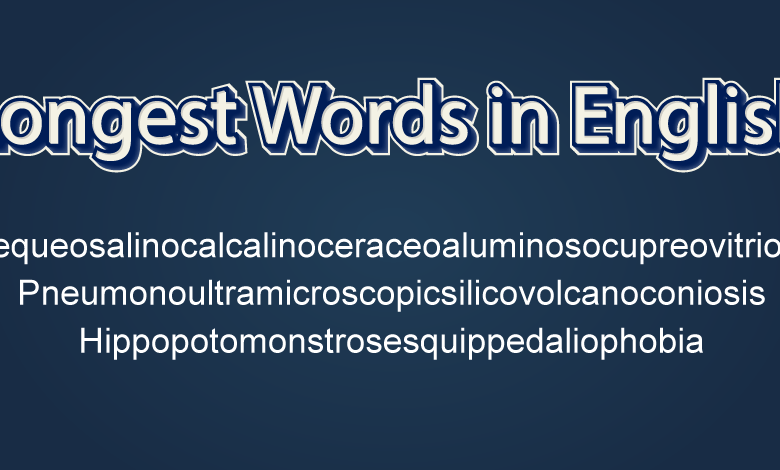Discovering the Longest Word: The World’s Most Unbelievable Long Words!

Have you ever wondered what the longest word in the world is? The longest word might surprise you! While many of us think of long words in our everyday language, there are certain words that are so long, they are nearly impossible to pronounce. In this blog, we’ll explore the longest word in different languages, its meanings, and how these super long words came to be.
The longest word in the English language is a mouthful! It is often considered a challenge to pronounce, and it’s used mostly in scientific or technical contexts. But don’t worry, you don’t need to be an expert to understand what makes these words so special. Let’s dive into the world of the longest words and find out why they exist and how they are formed!
What is the Longest Word? A Simple Explanation
The longest word is a term that might sound complex at first, but it’s easier to understand when you break it down. In simple terms, it’s a word that has the most letters compared to any other word in a specific language. This can be surprising because most people think long words are hard to pronounce, but some of them are surprisingly simple once you get to know them!
In English, the longest word is often said to be “pneumonoultramicroscopicsilicovolcanoconiosis.” It is a medical term used to describe a lung disease caused by inhaling very fine silicate or quartz dust. Though it might look complicated, breaking it down can help you understand it. While it’s not commonly used in everyday language, it still holds the title as one of the longest words in the dictionary.
However, the world has many languages, and each one has its own version of the longest word. For example, in German, long compound words are common. This means you can have a word that stretches across multiple words to form one huge term! Isn’t that interesting?

The Longest Word in English: What You Need to Know
The longest word in English, “pneumonoultramicroscopicsilicovolcanoconiosis,” is a very specific term. It’s important to know that, even though it has over 40 letters, it is a medical term. It’s rarely used in everyday conversations and mostly appears in medical books or scientific studies. So, even if it’s the longest word, don’t expect to say it during a casual chat!
- What does it mean?
It’s a lung disease caused by inhaling tiny particles from volcanic dust or fine silicate dust. - Why is it so long?
The word was created by adding smaller parts to describe the disease in detail. The longer it gets, the more specific it becomes!
In contrast, other long words like “antidisestablishmentarianism” (which is a political term) are a bit easier to understand. While still long, they are often used in different contexts, like history and politics. The fact that the longest word in English is often so technical means that most people won’t come across it in daily life.
How the Longest Word is Created: A Step-by-Step Guide
Words like the longest word don’t just happen overnight. They are often created by combining smaller words or parts of words. For example, medical or scientific terms tend to be built in a very methodical way. This method helps experts in specific fields talk about very detailed things.
Breaking Down the Longest Word:
- Roots: Many long words start with a root, which is the main part of the word that gives it meaning.
- Prefixes and Suffixes: Adding parts like “ultra-” (meaning very), or “-osis” (which means a disease condition), extends the word.
- Combining: Once you combine these smaller parts, you get a super-long word that describes something specific.
In medicine, this process is quite common because doctors and scientists need a very precise language. That’s why the longest word is used in medical texts. It helps them explain complicated diseases in a very detailed and accurate way.
Why Do Some Languages Have the Longest Words?
You might be wondering why some languages, like German, have such long words. Unlike English, which typically prefers shorter, easier words, German often combines smaller words into one long, single word. This can result in words that are much longer than those in English.
Here’s how this works:
- Compound Words: German is known for using compound words, where several words are put together to form a new one. For example, “Donaudampfschifffahrtsgesellschaftskapitän” means “Danube steamship company captain.”
- Efficiency: This method helps make the language more efficient. Instead of saying many different words, one long word can describe an entire concept.
While these long words may look intimidating, once you understand how they are formed, they make a lot of sense. Even though English doesn’t create words in this way, other languages embrace it as a natural part of their grammar.

The Fun and Fascinating World of the Longest Words
Learning about the longest word is not just about knowing big words. It’s about exploring how language evolves. Different cultures and languages around the world have come up with long words for various reasons—whether it’s for precision, history, or simply the love of creating new terms.
Why are long words interesting?
- They tell stories: Many long words have a historical or scientific background that makes them fascinating to learn about.
- They are fun to say: Even though they’re challenging, trying to pronounce long words can be a fun challenge.
- They show creativity: Some of the longest words in the world come from creative uses of language, showing how flexible and imaginative our languages can be!
If you enjoy the world of words, exploring the longest word can be both educational and entertaining. Each time you learn a new one, it’s like uncovering a hidden treasure in the world of language!
Conclusion
the longest word is not just a big, hard-to-pronounce word. It’s a fun way to explore how languages work and how words are created. Whether it’s a medical term like “pneumonoultramicroscopicsilicovolcanoconiosis” or a long compound word in German, these words tell interesting stories about science, history, and the way we communicate. So, the next time you hear a long word, you’ll know a little bit more about where it came from!Learning about the longest word can also inspire you to look at language in a new way. Even though these words might seem tricky, they show how creative and complex language can be. Who knows, maybe one day you’ll even impress your friends by saying one of these giant words! Keep exploring and having fun with words – the world of language is full of surprises!




